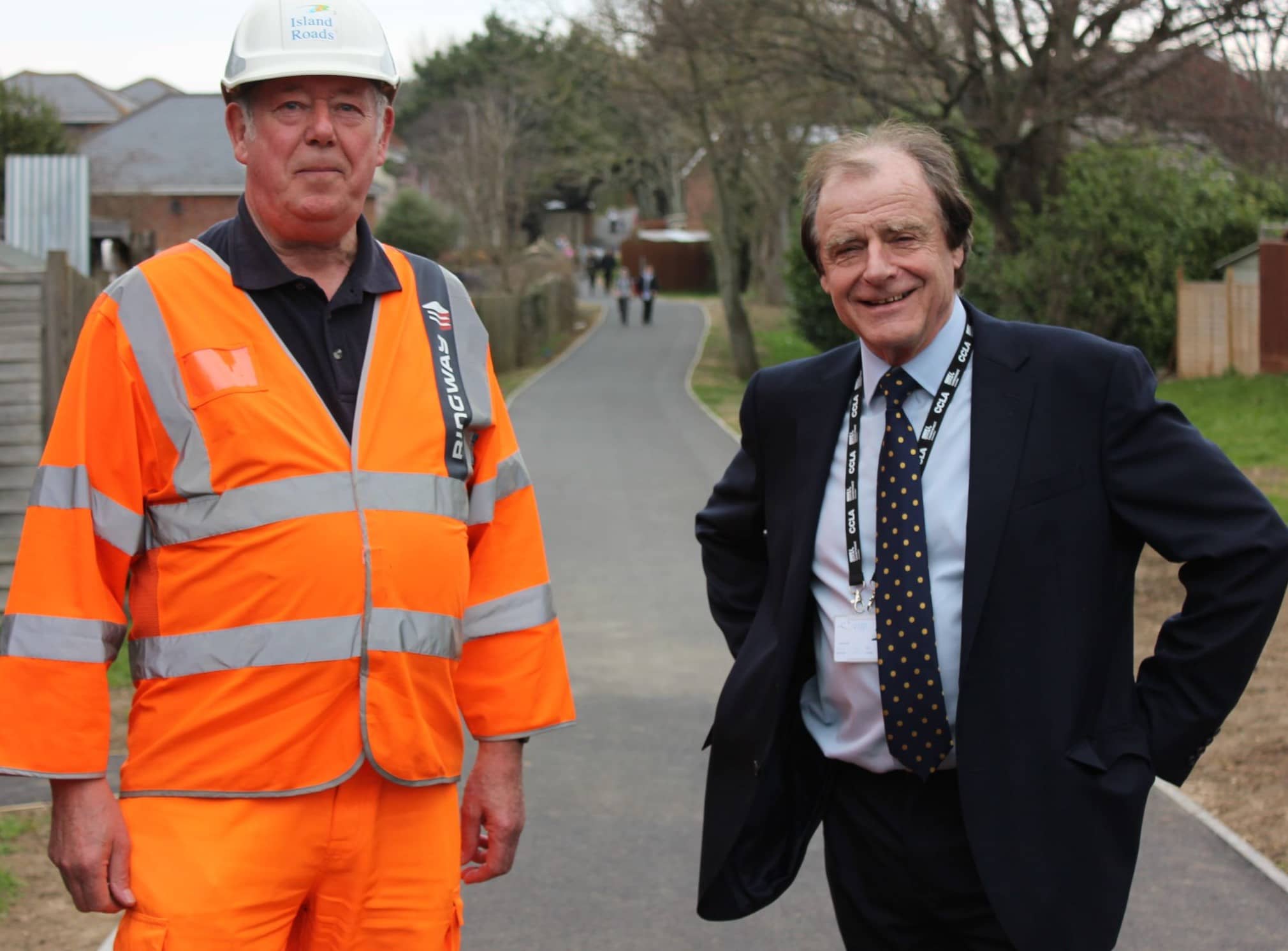As we are approaching half-way through the term of the Alliance Group’s time in office at County Hall, News OnTheWight approached each of the Cabinet members offering an opportunity to highlight the work of their portfolio and their hopes for the coming year.
We began with Isle of Wight council leader, Lora Peacey-Wilcox, followed by Cllr Jonathan Bacon, Cllr Julie Jones-Evans, Cllr Debbie Andre, Cllr Karen Lucioni, Cllr Karl Love and Cllr Chris Jarman.
The penultimate Cabinet member to share their update is Cllr Phil Jordan (pictured right), whose portfolio covers Infrastructure, Highways PFI and Transport. In his own words. Ed
To say 2022 was a strangely odd, yet extremely difficult, year would be an understatement of some magnitude. The work did not really start in January 2022 of course, we were already heavily involved and engaged with trying to resolve the Floating Bridge issue starting in July 2021 and continuing as the new year broke in January.
Always a difficult and complicated matter, we pushed hard for a settlement which resulted in agreeing to enter mediation on the basis there could be an achievable commercial settlement and that the Courts expect, and to some extent insist on, a mediation process before the Court will even hear a case.
We eventually ended up in London with all parties and a mediator and tried to agree a satisfactory and fair settlement. That process continued apace after the London meeting and eventually through determination and resolve, we agreed a settlement to the commercial dispute with all parties concerned.
Agreement was always going to be commercially confidential
Contrary to certain commentators views, the agreement was always going to be commercially confidential, and that was made clear to all parties from day one of mediation. I accordingly conveyed that, at several meetings prior to the settlement being agreed, within the council including Scrutiny and Full Council.
Without the commercial confidentiality agreement there was no mediation to be had and no settlement to be reached. I am sorry to have to repeat this countless times and I accept that commercial confidentiality is not ideal, but without agreeing to a commercial confidentiality agreement from the outset, we would have been faced with a High Court case, some three years of further time taken, around £1m and upwards of legal fee costs and no guarantee we would ever win such a case because of the complexities of the design and build contract.
A favourable, positive outcome for the council
A huge gamble we tried at all costs to avoid. I can assure you however that the settlement was considered a favourable, positive outcome for the council.
Work to understand the best future options for the service, including procuring a new (electric) vessel, are currently underway.
Operational research work through Highways Team
Throughout the year we have been running, in tandem, two pieces of operational research work through our Highways Team based up at Daish Way.
One has been the TRO (Traffic Regulation Orders) review which has looked at the past ten years of requests for safety schemes on parking restrictions across the Island; requests from councillors, Parish Councils, residents for example, which are being brought forward after public consultations and will continue throughout 2023 as they are considered for the whole Island.
Thereafter, we will review each geographical area of the Island every two years. I want to stress that the schemes being considered and brought forward are all based on highway safety concerns that have been raised, but if communities by majority do not want certain schemes, we will look for alternative solutions to the problem. We have amended proposals already and will continue to do so where necessary.
Policy to prevent loss of on-road parking spaces solely to enable developments
We also brought forward a specific TRO (Traffic Regulation Order) Policy that seeks to prevent the loss of on-road parking spaces solely to enable developments.
For years, it has been the case that planning permissions sometimes contained conditions that implemented parking restrictions close to the proposed access to the development site and they have been granted without question.
The new Policy now emphasises that planning conditions of this nature requiring parking restrictions, simply and solely, to enable the development, may not be granted. In future, conditioning of planning applications/approvals to include parking restrictions will be judged by the Highways Authority on a ‘case by case’ basis. It is not a Policy to prevent house building however. It is a Policy to safeguard on-road parking space.
Reviewing speeds on IW roads
The second work stream has been the speed review which has been going on for over a year now and has involved the gathering of raw data on the speeds of vehicles at over four hundred places on the Island.
The process of gathering the data has now concluded and being collated into a report for Cabinet, due around April 2023 which will contain recommendations and suggestions to consider addressing the growing demand for traffic calming in our villages and towns.
The challenges we face
It is clear we will need to prioritise schemes based on safety concerns and it is a reality that funding streams will not be able to deliver some of the requested measures at this time.
It is also a fact that reducing speed limits without enforcement – a Police matter – will not deliver the outcomes expected and that other traffic calming measures can be costly to implement and maintain. One of the ironies in all these problems is that on road parking can, and does, function as a traffic speed calming factor on many roads and that we must be careful in contemplating reducing on road car parking spaces where and when this is the case.
I am sure you will know of many roads on the Island that fall into this category!
Growing number of cars
There is no easy answer to the growing car ownership numbers on the Island – let alone the summer influx numbers – and the roads were never ever going to be sufficient for the traffic numbers we now experience and like most complicated issues, they are multi-faceted, complex and without single solutions.
Car travel and parking have become a modern-day conundrum that is difficult to address in a complete way especially when you consider that Government Policies and legislation impact part of the problem, we face… yet have no control over.
Longer-term aspirations
Part of the longer-term aspirations we have for Transport on the Island are being considered and planned for in the upcoming LTP4 (Local Transport Plan 4).
This is a far-reaching plan to 2038 which sets out a comprehensive and cohesive approach to Island travel and transport. Much of 2022 was spent developing the plan and is in early draft form with work continuing to bring forward a full draft to public consultation around the summer of 2023 and implementation thereafter in 2024.
It is far reaching and, in some ways, radical as the council have also committed to (effectively) net zero targets and transport infrastructure and systems will have to take that into account.
Sustainable travel initiatives
Already, sustainable travel initiatives have seen trials of both electric scooters across the Solent region and more recently trials of electric bikes have been introduced. Public transport will have to improve in varying ways and potential longer-term schemes for light rail considered.
Investment will have to be found to increase and improve the network of cycle/walkways across the Island to encourage those able, to use such travel opportunities away from traffic heavy roads. And in partnership, we must build an electric public charging network across the Island to meet the eventual change to electric powered vehicles.
Preliminary discussions have taken place with public transport operators in this regard and to ensure that ferries can operate successfully using electric powered means with facilities at Island terminals accordingly.
Drone deliveries for NHS
Finally, although this has been just a snapshot – not a comprehensive report on all of our activities during the year, work to change the face of NHS treatment continues with potential delivery of specific medicines (cancer treatments in particular) to the Island by Drone.
I thank Solent Transport, with whom we work closely on transport related matters, for their determination and dedication in trying to get this life changing initiative for the Island into operation. Let us hope 2023 sees progress on this.
The whole idea of travel across the Solent for medical treatment has become an extremely sensitive and worrying issue for many people. We could do better, and I do hope the Drone initiative comes to fruition sometime soon. It is extremely complicated, however.
The Highways PFI
I have purposely left the PFI contract out of this brief update. It remains an ongoing contract with fifteen years left to run and poses operational issues on a daily, if not hourly, basis.
Budget cuts implemented in 2020 have impacted services in many ways and with around £1.5m to £2m per year reduction in services, read cuts, delivered through the PFI contract, outcomes measured against public expectations have fallen even further than imagined. The CIP (Core Investment Period) has come and gone, and we are now in the ‘maintenance’ phase of the contract.
I simply do not have enough space here to explain how and why we are where we are on the PFI contract.
More to come
I am planning to write a specific article in the coming year about the challenges we face on the PFI contract, what works and what does not and how we can try to get the best out of the remaining fifteen years to improve our road and pathway network.
So, in 2023, we will continue to deliver on the highway infrastructure initiatives we are already working on, plan for a longer future to 2038 and beyond and try to join up the dots on the myriad of complexities that Transport issues delivers.
Lack of funding will be a big hurdle, as will collaborating with private companies in partnerships with competing agendas and against a growing uncertainty of economic (un)sustainability and inflation which has a serious impact on future capital works schemes we may have planned.
Coastal erosion challenges
As an example, we are facing a huge challenge on the Military Road where the coastal erosion is threatening the very existence of the road. There is no easy answer, land ownership, competing aspirations on ecology, nature issues and huge funding gaps may finally defeat us.
A planning application is due in March for some temporary interventions which might slow the effect of erosion, but it will not stop it and eventually there must be another solution. We can delay, but the future is either re-routing the road at huge costs and unfathomable problems to overcome or to close the road at this point and route through the villages to and from Freshwater.
To further complicate matters the DfT have indicated thus far there is no business case to build a new road – even if it were operationally possible. (That is not a given either). That closes the door on the many millions required to re-route the road successfully. Just one of the varied problems 2023 will bring to deal with.





